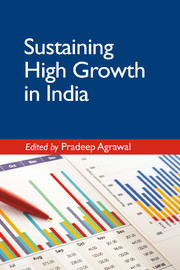Book contents
- Frontmatter
- Contents
- List of Tables
- List of Graphs and Maps
- Preface
- Introduction
- Section 1 Ensuring Macroeconomic Stability for Sustaining High Growth Rates
- Section 2 Promoting Industrial Development for Sustaining High Growth Rates
- Section 3 The International Economic Issues and Sustaining High Growth
- Section 4 Infrastructure Bottlenecks to Sustaining High Growth
- Section 5 Some Socio-political Issues in Sustaining High Growth
- 13 Demographic Dividend and Economic Growth in India and China
- 14 Does Social Cohesion Limit Uncertainties in Economic Growth? A Pre-and Post-reform Analysis from India
- 15 Does Openness and Democracy Reduce Corruption? Results for South Asian Nations and India
- 16 Regional Dynamics of Rural Credit and Growth in India: Exploring Nonlinearity and Convergence in Growth Patterns
- List of Contributors
- Obituary
- Index
15 - Does Openness and Democracy Reduce Corruption? Results for South Asian Nations and India
from Section 5 - Some Socio-political Issues in Sustaining High Growth
Published online by Cambridge University Press: 08 February 2018
- Frontmatter
- Contents
- List of Tables
- List of Graphs and Maps
- Preface
- Introduction
- Section 1 Ensuring Macroeconomic Stability for Sustaining High Growth Rates
- Section 2 Promoting Industrial Development for Sustaining High Growth Rates
- Section 3 The International Economic Issues and Sustaining High Growth
- Section 4 Infrastructure Bottlenecks to Sustaining High Growth
- Section 5 Some Socio-political Issues in Sustaining High Growth
- 13 Demographic Dividend and Economic Growth in India and China
- 14 Does Social Cohesion Limit Uncertainties in Economic Growth? A Pre-and Post-reform Analysis from India
- 15 Does Openness and Democracy Reduce Corruption? Results for South Asian Nations and India
- 16 Regional Dynamics of Rural Credit and Growth in India: Exploring Nonlinearity and Convergence in Growth Patterns
- List of Contributors
- Obituary
- Index
Summary
INTRODUCTION
Corruption issues have gathered momentum as it is pervasive and has an adverse impact on economic development in the long run. Corruption is seen in both advanced and poor countries, in the public and private sectors and even in the non-profit and charitable organizations (World Bank, 1997). Also, corruption scandals have not only toppled governments, ruined careers of world-renowned public figures, tarnished organizations and businesses, but also affected talented public/private sector employees when they become rent-seekers. Studies have established the detrimental impacts of corruption on all societies, which also explain the poor economic performance especially in the developing economies (Rose-Ackerman, 1978; Klitgaard, 1988; Knack and Keefer, 1995; Mauro, 1995; Bardhan, 1997 and Brunetti et al., 1998).
As large parts of developing Asia are impacted by development deficits, high levels of corruption and moderate level of political and economic freedom, it is important to examine whether economic development and more open societies have a role in combating corruption in Asia. We examine whether openness of the economy leads to a reduction in corruption using a panel estimation of 22 Asian countries, followed by its impact for South Asian nations. Furthermore, we extend the analysis to evaluate the openness-corruption nexus in the case of India and provide an insight into the changes in the level of perceived corruption, democracy, openness, and economic development. The focus here is not only on detecting the linear effects but also evaluating the existence of any nonlinear relationship after controlling for social, economic, and institutional factors.
The causes and effects of corruption have been noted in numerous studies (Bardhan, 1997; Treisman, 2000); it is noted that prevalent corruption is negatively linked to the level of economic development of a country. Therefore, rich countries (i.e. high per capita income nations) are perceived to be less corrupt than poor nations (low per capita income countries) (Lambsdorff, 2006). Although such a stability or reduction in perceived corruption has been accompanied by the significant rise in real income per capita, it remains unclear whether a rise in income steadily reduces corruption in countries or regions with higher level of economic development, similarly, do higher levels of democracy and openness combat corruption?
- Type
- Chapter
- Information
- Sustaining High Growth in India , pp. 465 - 488Publisher: Cambridge University PressPrint publication year: 2017



